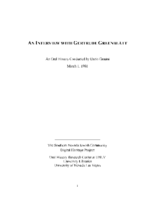Search the Special Collections and Archives Portal
Search Results
Lois Bell oral history interview
Identifier
Abstract
Oral history interview with Lois Bell conducted by Sam Cusimano on unknown date for the Ralph Roske Oral History Project on Early Las Vegas. Bell discusses her time as a cocktail waitress in various casinos, including her experiences of waiting on various celebrities. Bell also describes the changes of the Las Vegas Strip, her account of witnessing atomic testing events, and her position at Roxie’s, a brothel that existed during the early days of Las Vegas, Nevada.
Archival Collection

Transcript of interview Hobert D. Blair by Arnel Wilks, March 10, 1975
Date
Archival Collection
Description
Text

Labor Day Parade in Tonopah (Nev.): photographic print
Date
Archival Collection
Description
Image
Oneil Madden oral history interview
Identifier
Abstract
Oral history interview with Oneil Madden conducted by Yasmine Shahar and Taylor Burk on March 31, 2016 for the African Americans in Las Vegas: a Collaborative Oral History Project. In this interview, Madden discusses his upbringing in Montreal, Canada. He talks about his religious family background, being involved in church activities, and his involvement with church youth programs. Madden describes food banks organized by the churches, tutoring services for children, and explains the significance of the Sabbath. Lastly, Madden discusses his role as pastor of Abundant Life Seventh-Day Adventist Church in Las Vegas, Nevada.
Archival Collection

Transcript of interview with Gertrude Greenblatt by Dario Gratini, March 1, 1981
Date
Archival Collection
Description
Interview with Gertrude Greenblatt by Dario Gratini on March 1, 1981. In this interview Greenblatt talks about arriving in Las Vegas in the 1940s, and the changes that took place place such as population growth, price increases, employment requirements, and recreation. She also talks about the changes in utilities and environmental issues.
Text
Rozita Lee oral history interviews
Identifier
Abstract
Oral history interviews with Rozita Lee conducted by Stefani Evans, Cecilia Winchell, Kristel Peralta, Vanessa Concepcion, Jerwin Tiu, and Su Kim Chung on June 1, 2021, April 12, 2022, and May 18, 2023 for Reflections: The Las Vegas Asian American and Pacific Islander Oral History Project. Rozita shares her experiences growing up on a sugar plantation with her family in Hawaii. She talks about the benefits her family received and the "privileged" life she led with her father as the plantation boss, allowing her household to have electricity, plumbing, and a telephone. Rozita discusses her use of Pidgin English amongst her peers and "good English" in her household, and the roles and responsibilities her parents had working on the plantation. She shares what life was like day to day and what she remembers growing up during World War II including hearing air raid sirens and hanging blackout curtains in her home. Rozita also talks about meeting her husband, Clifford Lee, in high school, their marriage in 1979, and how the couple came to move to Las Vegas. In the second interview, Lee discusses pursuing a bachelor's degree at the University of Nevada, Las Vegas (UNLV), working with Governor Miller and Bob Bailey, and her involvement in a Polynesian show at Imperial Palace for eighteen years.
Archival Collection

Transcript of interview with Edward Gregory by Jonathan Bellingar, March 2, 1977
Date
Archival Collection
Description
On March 2, 1977, Jonathan R. Bellingar interviewed Edward Gregory (born July 28, 1922) about his life in Nevada. The interview takes place at Nellis Air force Base; also present during the interview is an unidentified man. Gregory was born and raised in Nevada; he discusses leaving Nevada to serve in the Army during World War II before eventually returning to Nevada in 1950. The interview concludes with a brief overview of how Nellis Air force Base has changed since the 1950s.
Text

Transcript of interview with Dick Chapter by Stan Hawkins, March 6, 1979
Date
Archival Collection
Description
On March 6, 1979, Stan Hawkins interviewed furniture refinisher, Richard T. Chapter (born January 28th, 1933 in Maine) at his home in Las Vegas, Nevada. During the interview, Richard recalls swimming at the old ranch, going into the furniture refinishing business, and the cost of living in Las Vegas. He also discusses Howard Hughes, the Boulder Dam, and the Union Pacific Railroad. Richard’s wife is also present during the interview and interjects comments about the old Mormon Fort, gambling, local business, and the weather in Las Vegas.
Text
Esther Horner oral history interview
Identifier
Abstract
Oral history interview with Esther Horner conducted by Maureen Brannon in approximately 1977 for the Ralph Roske Oral History Project on Early Las Vegas. Horner discusses the inaugural Helldorado Parade, her family’s establishment of B & H Grocery in Las Vegas, Nevada, atomic tests, presidential visits, social clubs, and the tragic death of actress Carole Lombard in a plane crash in Nevada. Horner also offers insight into religious life, the red-light districts, including the infamous Block 16, racial segregation, and gambling in the early days in Las Vegas.
Archival Collection
Bertha Gresh oral history interview
Identifier
Abstract
Oral history interview with Bertha Gresh conducted by Gary Eagleson on November 30, 1974 for the Ralph Roske Oral History Project on Early Las Vegas. Gresh discusses the history of Las Vegas, Nevada. Gresh then talks about mining and offers details surrounding specific mines, such as the Black Hawk Consolidated or Ran [Rand] Mine, the Techatticup Mine, the Wall Street Mine, and the Duncan Mine. Gresh then discusses the early days of Boulder City, Nevada and Henderson, Nevada. She also briefly mentions Block 16.
Archival Collection
